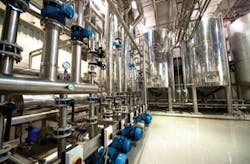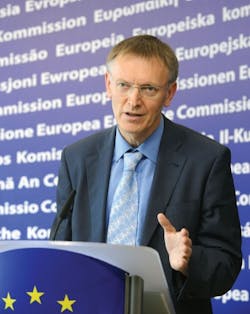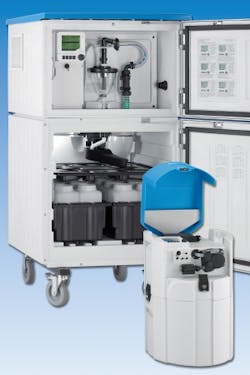And How He'll Deliver Europe's Water Blueprint
The four member states of Belgium, Greece, Portugal and Spain have still not submitted River Basin Management Plans. Jeremy Josephs speaks exclusively to EU Commissioner for the Environment Janez Potocˇnik to discuss why and the imminent EU's Water Blueprint.
It might well be a long way to Tipperary. It's also a fair old distance between Ljubljana in Slovenia and Brussels. That one thousand kilometer journey between those two handsome and historic capitals, however, has become more than a little familiar to Janez Potocˇnik. The former Slovenian academic now has a career in Belgium as European Commissioner for the Environment.
Tenacious tweets
An indication of what Potocˇnik gets up to between 9 and 5 is given if you follow his twitter account. Take these three tweets: 'Reminded Poland to comply with EU legislation on water protection, especially monitoring of water quality'; 'Taking France to court for failing to combat water pollution by nitrates' - and, last but not least - and as one might expect for such an enthusiastic tweeter 'Asked Malta to improve the protection of birds that pass over its islands in autumn.'
It's a vast and wide ranging brief. And one which, surely, must be extremely challenging to
"Well, yes and no", he responds, somewhat confusingly. "But I am very clear about one thing – that water is currently at the top of my agenda. In 2012 we are carrying out a large-scale assessment of EU freshwater policy, identifying current gaps and future priorities. The results will appear at the end of the year in a strategic document called the Water Blueprint. To me water quantity and water quality are really two sides of the same coin but I think we can safely say that in Europe we need to enhance our focus on quantity.
"It isn't a major feature of our legislation at present, and we need more tools to improve water efficiency and to address challenges like scarcity, droughts, floods, climate change, demographic developments and rising demand for food and energy. But we also need to protect water ecosystems and the services they provide from pollution and physical changes."
The response again illustrates the vast sweep of Potocˇnik's remit. It's being able to contribute to this field that he says is in itself rewarding.
"Small and big results that go in the right direction are what matter to me most. I am very pleased with the progress we have made in the past years. I could think of REACH, for example, our scheme to promote substitution of dangerous chemicals and to foster innovation of new and safer substances. We have also been working to improve the quality of our inland waters and our seas. And we have made real progress in our waste collection and treatment."
Eurozone crisis – water stimulus or stranglehold
More urgently is the question of how the Eurozone crisis is going to negatively impact environmental issues in general – and water issues in particular. Are countries really going to invest their limited resources in cleaning up rivers when other priorities – schools, hospitals and so on – are clearly crying out for urgent and immediate investment?
Potocˇnik reverts to the more traditional discourse of the career politician, having served as Slovenia's Minister for European Affairs.
"There is no denying that environment and water policy are both affected by the crisis", he affirms. "Of course this is a difficult period, and governments need to find ways to save money. But this doesn't mean just any kind of budget cuts – governments can make a choice to protect investments which have a positive return. That's what the Commission means in calling for 'smart fiscal consolidation'.
This is common challenge in the environmental field, and the EU can learn a lesson from China and South Korea in this respect. In 2008, at the beginning of the crisis, these countries invested heavily in green recovery packages, because they recognised that the environmental sector generates growth and jobs. EU recovery packages were less focused on this aspect, and I think this is part of the reason why we are still in trouble today, the commissioner adds.
"Most economic sectors depend on the availability of clean water, which is why securing it is the central objective of EU water policy. Protecting water is a way of ensuring that agriculture, fisheries, transport, energy, tourism and many other industries continue to develop. But time is always a problem in the environmental field. Short-term economic gains from the overexploitation of natural resources are really net losses, and they only make us poorer in the long term."
Water Framework Directive (WFD)
Requiring counties to invest substantial sums to bring their water bodies up to "good" ecological status, could it be argued that the WFD is actually making nations poorer in the long-term and Europe would be better off without the additional regulation?
Not surprisingly, Potocˇnik, disagrees.
"No, I wouldn't express myself in that way at all," he responds sternly. "In fact the WFD was a genuine breakthrough in European environment policy, because it completely changed the water management environment. The main impact comes from the objective of ensuring good ecological status of all waters, while simultaneously establishing the necessary framework to combine environmental objectives with economic growth and social development.
"The integrated management that has resulted, bringing together all water users beyond administrative boundaries, has had a major impact in the Member States. Still, there are four Member States that have not yet adopted RBMPs: Belgium (specifically Wallonia and Brussels region), Greece, Portugal and Spain."
Demonstrating a mastery of his environmental brief, Potocˇnik then rattles through each country, explaining that the reasons behind the delay differ according to each case. In Portugal, he says, the main challenge was to put in place new river basin authorities to implement the WFD concept of water management at river basin scale.
In Spain, he tells you, there have been heated debates about water for the past decade, although several RBMPs have now been adopted and technical work on others is largely complete. "The adoption process is an ideal opportunity for all stakeholders to agree a joint approach to sustainable water management, based on the WFD principles, and we are confident that the Spanish authorities will make significant progress this year with the adoption of the remaining plans. Of course we will be keeping up the pressure on them to deliver."
At the European level, pressure means pressure and countries cannot be taken to court without good reason.
"That's correct," he adds. "The Commission uses all available legal instruments to ensure Member States implement the WFD. There are cases concerning all four Member States that have not yet adopted the plans before the EU Court of Justice, and we expect rulings this year.
"Member States could face significant fines if the Court finds against them and they still fail to act. Going to court is clearly a serious procedure. But bear in mind that we are in a serious situation."
Potocˇnik goes onto add that water demand is growing and precipitation patterns are changing, so there is an urgent need for Member States to respond to threats like water scarcity and pollution with appropriate management tools, and that's what we are asking them to put in place.
Country exemptions
"The WFD isn't just there to solve past mistakes", he says vehemently. "It's also there to help Member States plan for future challenges. There are other tools to improve implementation too, including a comprehensive informal process called the Common Implementation Strategy, a joint Member State - Commission initiative which also involves EFTA, EU candidate countries and stakeholders. The process has been in place since 2001 and has delivered extensive guidance on WFD implementation, as well as a platform for best practice exchange."
The Commission's plan to one side, one question remains, especially in the current economic climate. It is possible to be exempt from meeting targets if countries or regions are unable to meet aims on the grounds of unequal costs. So who decides whether to grant these exemptions and what criteria is used?
"When the Directive was adopted, its objectives had already been the subject of extensive discussions and consensus by Member States," Potocˇnik responds quickly. "Its adoption was a significant achievement in EU environmental policy. And when they agree EU laws, Member States also agree to implement them. That said, exemptions are included in the Directive and can be applied by Member States in some specific cases, if they are justified under the strict criteria set out in the Directive.
"The exemptions aren't there to help people avoid their obligations – they are a tool to balance economic development with sustainable water management. They also allow for the fact that not all objectives can be obtained by the deadline, even if all measures are taken: aquatic ecosystems can sometimes take a long time to recover.
"As you know, the Commission is currently assessing the RBMPs, and we will ensure that the criteria applied for exemptions are in line with the WFD.
"The conclusions of the assessment will be part of the WFD implementation report to be included in the 2012 Blueprint."
Water-energy nexus
What about the relationship between water and energy? After all, there can clearly be conflicts between these two areas such as with hydroelectric power plants and the biological status of rivers. If the EU really wants to increase this type of renewable energy, is there not a danger that it could damage fish activity, fish development and hydro-biological aspects?
"What people have to realise", Potocˇnik insists, "is that preserving nature and meeting renewable energy targets are not mutually exclusive. This is why the Commission has developed guidelines for hydropower facilities. In the guidance, we recommend supporting the modernisation and upgrading of existing infrastructures, and improving water quality through clear ecological standards for both new and existing facilities.
"These standards should include passages for fish, and the establishment of a minimum ecological flow. Another recommendation is to develop pre-planning mechanisms that allocate suitable areas for new hydro-power projects, and designate rivers in areas of high ecological value as "no-go" areas for hydropower schemes. The designations should be the result of dialogue involving stakeholders and the different competent authorities."
Is there a final message the European Commissioner for the Environment would like to send out to WWi readers?
"Yes, as a matter of fact there is. I would just like to highlight the ambitious nature of the Water Blueprint we are preparing at the moment. The aim is to steer water policy development until 2020, using an analysis that integrates economic and climate modelling till 2050. It's a major exercise, and I trust it will bear fruit for many years to come."
And with that the European Commissioner for the Environment had to away. There was much tweeting to be done.
More Water & WasteWater International Current Issue Articles
More Water & WasteWater International Archives Issue Articles





